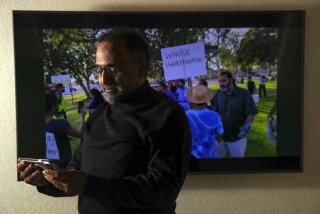A Subcontinental Rivalry Where Tolerance Wins
- Share via
The current Indian cricket tour of Pakistan is reaching a climax after a long and closely fought series. The four weeks that have preceded this one have done wonders for India-Pakistan relations off the field: The thousands of Indian tourists who received “cricket visas” to attend the games have been welcomed with such warmth in Pakistan that the Indian media have been overflowing with tales of the hospitality and generosity of their hosts.
So many Indian visitors have found themselves receiving “friendship discounts” at stores (and free food and drink) that a popular joke has local Pakistanis pretending to be Indian tourists in order to enjoy some of the same benefits. This has been such a far cry from the bitterness and hostility between the two countries in recent years that cricket has entered the diplomatic lexicon as the most effective of “Track Two” confidence-building measures. It hasn’t hurt, either, that the cricket played has been exceptionally memorable.
But the Indian performance in Pakistan may have important consequences for Hindu-Muslim relations within India as well. Few events have been as emblematic of the deterioration between the two major religious communities of the subcontinent as the horror of the Gujarat massacres in 2002, when upwards of 1,000 Muslims were murdered in retaliation for the burning alive of 59 Hindus on a train by a Muslim mob.
Now, just two years later, one of the newest stars of the Indian team in Pakistan is a 19-year-old Indian Muslim from Gujarat, Irfan Pathan, playing only his second tour at the senior level.
The sight of this telegenic young man bounding down to hurl his well-placed thunderbolts at the Pakistani batsmen has been filling Indian hearts with a potent mixture of pride and awe. The Indian team, one of the best of all time, is full of players of great achievement, and Pathan is still too young and too raw to be mentioned in the same breath. Yet what he has brought to the squad is far more than the vigor of his youth and his fresh-faced good looks, far more than the energy and enthusiasm that animate his exceptional skill as a fast bowler. It is that his performance is testament, also, to the indestructible pluralism of India.
Many Muslims have played cricket for India; three have even captained the country. But the violence in Gujarat had brought to the forefront many rabble-rousers -- like Pravin Togadia of the fiercely anti-Muslim Vishwa Hindu Parishad, or World Hindu Council -- who took the opportunity to redefine Indianness on their own terms.
Neither Pathan’s religion nor his ethnicity would have qualified him as Indian enough in the council’s eyes. He is not just a Muslim, but the son of a muezzin, one whose waking hours are spent calling the Islamic faithful to prayer. Worse still, he is a Pathan, whose forebears belong to a land that is no longer part of Indian territory. To be a Gujarati Muslim Pathan is a triple disqualification in the eyes of Togadia.
But Pathan has not just shrugged off this treble burden, he has broken triumphantly through it. And he has done so without apology for his identity or his faith. Interviewed after one match-winning performance, Pathan spoke of his happiness that India had won “after” (not “because of”) his bowling, and attributed this success to his maker. “God is with me. I knew with God’s help I’ll bowl well. I had that confidence in God.”
The muezzin’s son had invoked Allah’s blessings on his predominantly Hindu team, seemingly oblivious to the fact that its opponents were playing under the green banner of an Islamic republic. What a wonderful reinvention of Indian secularism.
So when Pathan beams his dazzling smile after taking yet another wicket for the India he so proudly represents, he makes Indians feel more than cricketing pride. He reminds us that India is a country where it is possible for a 19-year-old from a beleaguered minority to ascend to the peak of the nation’s sporting pantheon; and, even more, that he represents an idea, an immortal Indian idea that some have allowed themselves to forget: that the country is large enough and diverse enough to embrace everyone who chooses to belong to it, whatever their caste, creed, color, costume or custom. The pluralist palimpsest of Indianness can never be diminished by the killers of Gujarati Muslims and the evil men who incited them. Irfan Pathan is their standing, leaping, glorious repudiation.
*
Shashi Tharoor is a prize-winning novelist and the author, most recently, of the biography “Nehru: The Invention of India” (Arcade Books, 2003).

